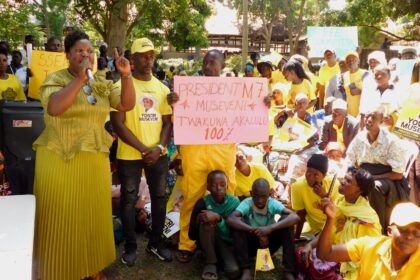By Denis Jjuuko
Over the weekend, I was invited to test drive Kiira Motors’ latest car, the Kiira EVS, a four seat coupe. When I posted the photos on my social media platforms, there were mixed reactions. Those who believe Uganda can make cars and the usual skeptics.
The argument the skeptics always give is that Uganda doesn’t have a competitive advantage to make vehicles even when 95% of all buses and trailers in Uganda are built in neighbouring Kenya and 100% of specialized tourism vehicles are made in Arusha — a town the size of Soroti without any industries to talk about.
The theory of competitive advantage, which is usually confused with the one on comparative advantage, posits that there are advantages that make one company or country competitive over another. That a country or company should concentrate on products in which it has an advantage over another. This theory, just like the comparative advantage one, is a myth.
The competitive advantage theorists ignore the role of technology in their assumptions. The availability of technology ensures that a company in Uganda can be able to produce the same goods as any other anywhere in the world. For example, when it comes to cars, design technology is available and the automotive parts suppliers are the same. It doesn’t matter where the factory is. That is why a country like China, which made almost zero products in the 1960s is now the leading factory of the world. China didn’t have any competitive advantage in the 1970s and 1980s when they started creating industries. They had many unemployed people just like Uganda. They just attracted technology from western countries and started creating these factories. Today, there is almost no product that can be made in the west that can’t be made in China. So where did they get their competitive advantage?
When Mo Ibrahim started his mobile telephone business that made him the billionaire that he is now in Africa, there was no competitive advantage for mobile phones. Africans were poor, didn’t have electricity, and perhaps people said didn’t have anybody to call. In a few decades, Africa — at least the urban areas are as connected telephonically as anywhere else in the world. If Mo Ibrahim had listened to the competitive/comparative advantage theorists, he wouldn’t have created his empire. He probably knew that the competitive advantage theory was a myth.
Most African competitive advantage theorists argue that Africa’s advantage is in agriculture. On the surface, it is. It is almost green everywhere with favourable climate for agriculture at least in the Sub Sahara region. But land ownership in Africa is a mess as very few people own land that is significant enough for profitable agriculture. Farming where each household uses rudimentary tools to grow its own food can hardly grow enough of it for the entire continent. There are many post-harvest losses in such an environment on top of low yields. Such households depend on God to provide rain and when God doesn’t, there is hunger.
The US, which is a technologically advanced wealthy country still grows more food than Africa yet the percentage of its people involved in agriculture is less than 2% compared to Africa’s 80%. That explains why Africa still imports food worth USD35 billion annually.
The USA, which competitive advantage theorists would not consider to have an edge in agriculture is the world’s largest exporter of food stuffs. In 2017, according to CNN, the top export earner for the US was food, beverage and feeds bringing in USD133 billion. Soybeans were the number one product at USD22 billion followed by meat and poultry at USD18 billion. Dairy, eggs and honey are the fastest growing exports from the US — a really by competitive advantage theorists — a non-agricultural country.
So if 80% of your population is involved in agriculture and still imports more food than you grow, then you don’t have a competitive advantage in agriculture and therefore you should look elsewhere.
You can argue that since the US exports more agricultural products than other countries, then Africa should concentrate on agriculture as well. The US is a huge country where land fragmentation isn’t an issue like it is in Africa. The average size of a farm in the US is 444 acres compared to 5.9 acres in Africa.
What turned around the fortunes of China and indeed the entire developed world was how fast they industrialised. Countries develop when the majority of their populations have predictable income, which can’t be provided by rain-fed agriculture. Industries and perhaps the growing service sectors provide that opportunity. Countries that add value to their products develop faster than others. Not those depending on subsistence agriculture.
Africa has a huge unemployed workforce which is semi-skilled and suitable for industrial work, possesses many minerals which are exported as raw materials, many rivers and abundant sunshine which can be tapped for electricity generation. So if the competitive advantage theory holds any water for Africa, it is in industrialisation.
The author is a Communication and Visibility Consultant. djjuuko@gmail.com
*Photo of participants at the #ParliamentWeek check out the Kiira EVS at the Parliamentary Building in Kampala this week
Do you have a story in your community or an opinion to share with us: Email us at Submit an Article






